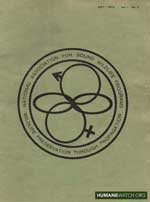1977 excerpt, National Association for Sound Wildlife Practices newsletter
 This document is a three-page excerpt (with front matter) from the October-November 1977 newsletter of the National Association for Sound Wildlife Practices (NASWP). The organization, which no longer exists, reported in this issue on a 1974 Washington, DC meeting of 14 wildlife-oriented groups:
This document is a three-page excerpt (with front matter) from the October-November 1977 newsletter of the National Association for Sound Wildlife Practices (NASWP). The organization, which no longer exists, reported in this issue on a 1974 Washington, DC meeting of 14 wildlife-oriented groups:
In June of 1974 the Wild Canid Survival and Research Center hosted the Symposium on Endangered and Threatened Species in Washington, D.C. During the symposium a group of 14 organizations formed the “Continental Coalition” and developed 26 principles that reflect the viewpoint of this group.
Later that year, the group of 14 (now renamed the “Wildlife and Habitat Coordinating Committee,” issued a press release formally endorsing those 26 principles. The Humane Society of the United States was one of these organizations, as was the Fund for Animals (which would later merge with HSUS), and the HSUS-affiliated International Fund for Animal Welfare.
The principles endorsed by these groups included:
- a ban on “the sale of non-domestic animals as pets”;
- a ban on “all commercial exploitation … of wild animal products”;
- strict regulation of “all commercial industries involved in collecting wild (non-domestic) foods (fish, etc.)” and “the development of alternative food sources” including “soy bean fields”;
- a ban on “collecting of wild flora and fauna for any commercial use” except medicine and education;
- immediate “moratoria on hunting … when there is any element of doubt as to their population in a given area”;
- “international monitoring” of “any human intervention” in natural ecosystems; and
- “immediate intervention” to stop corporate development of ecosystems :when there is no evidence to prove that human interference will have no deleterious consequences, i.e. GUILTY UNTIL PROVEN INNOCENT.”
We believe reproducing this material constitutes a “fair use” as provided for in section 107 of the U.S. Copyright Law. If you wish to use this material for purposes of your own that go beyond “fair use,” you must obtain permission from the copyright owner.



